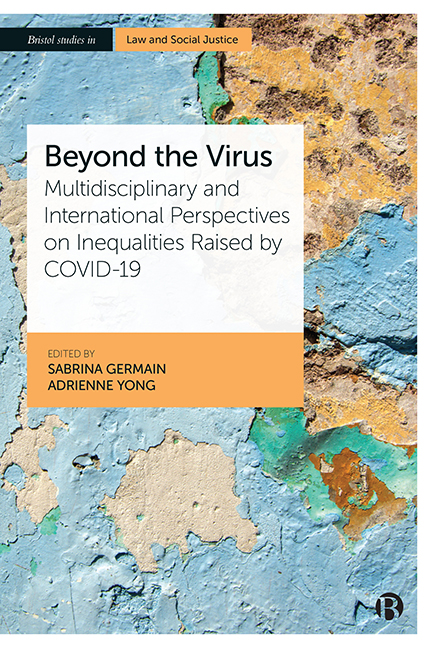 Beyond the Virus
Beyond the Virus 3 - Mitigating Social Inequities in Quebec: Governance Law to the Rescue?
Published online by Cambridge University Press: 17 January 2024
Summary
Introduction
The global pandemic of COVID-19 provoked an unprecedented mobilization of governments and stakeholders from different fields of activity around the world. Very quickly, faced with the urgent threat that COVID-19 represented for the health and survival of individuals, a large proportion of public resources was mobilized to try to understand how the virus worked and to limit as far as possible its spread and its deleterious effects on the health of populations. However, the pandemic occurred in a context already marked by significant social inequalities, which are likely key in understanding the virus and its effects on already vulnerable populations. For example, in Canada, mortality from COVID-19 was higher among women due to their overrepresentation among healthcare workers highly exposed to the virus (Bastien et al, 2020). In addition, lower income households were often less likely to be able to work remotely and many lost their jobs due to the pandemic (Chief Public Health Officer of Canada, 2020).
The notion of syndemic (which comes from merging the words synergy and epidemic) allows us to highlight the distributive and differential effects of COVID-19 by recognizing its medical, environmental and social constituents, and the influence of the latter on the aggravation and spread of the virus (Horton, 2020; Singer and Rylko-Bauer, 2021). Indeed, structural factors such as poverty, homelessness and food insecurity are increasingly recognized as important drivers of the negative effects of the pandemic (Singer and Rylko-Bauer, 2021; Ahmed, 2020; Williams and Cooper, 2020). In the context of COVID-19, in addition to these structural factors, the emergency measures themselves also contributed to exacerbating social inequalities (Carde, 2020), including various containment measures. Even before the COVID-19 pandemic, it was recognized that: ‘[s]ocial distancing measures designed to limit the spread of contagious disease are fundamentally at odds with the structures, institutions, and routines necessary to access food, shelter, and support’ (Mosher, 2014: 948).
Faced with an urgency to act and aware of the perverse effects of the emergency measures on certain groups of the population, decision-makers experienced major governance challenges.
- Type
- Chapter
- Information
- Beyond the VirusMultidisciplinary and International Perspectives on Inequalities Raised by COVID-19, pp. 56 - 76Publisher: Bristol University PressPrint publication year: 2023


